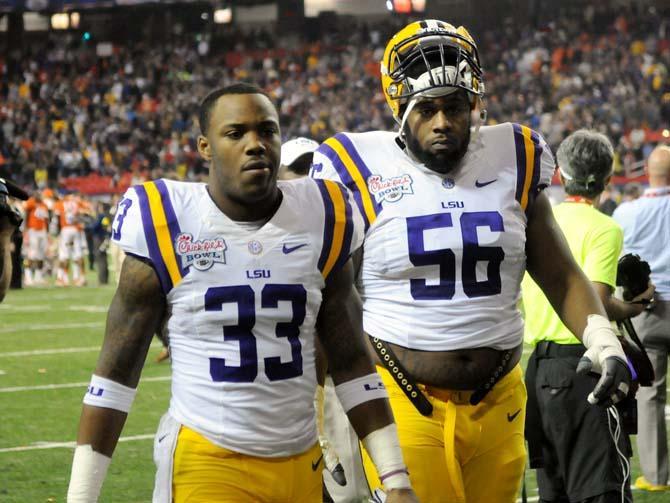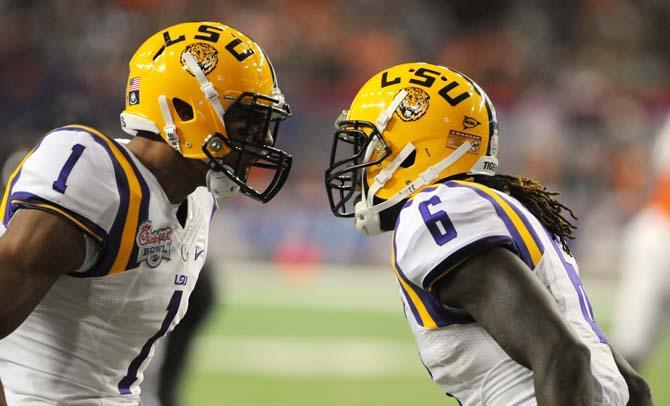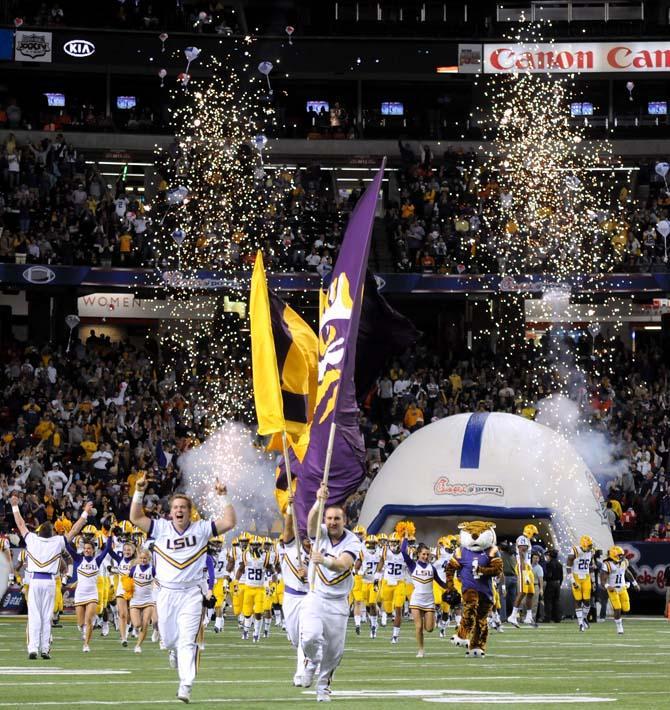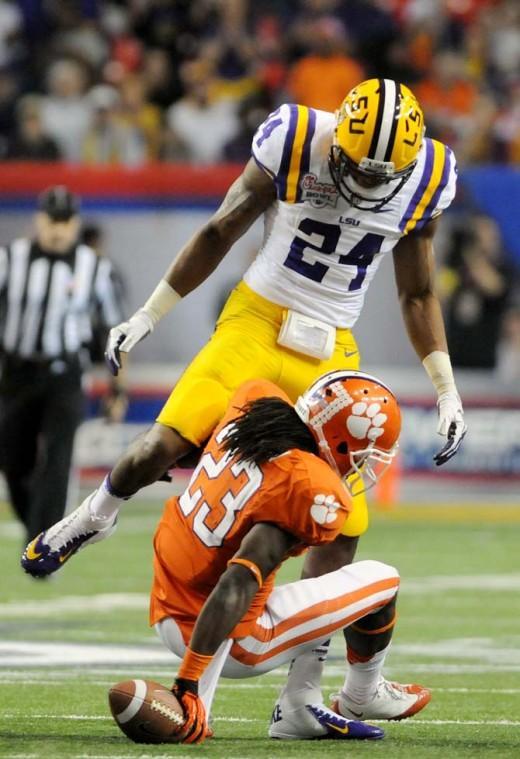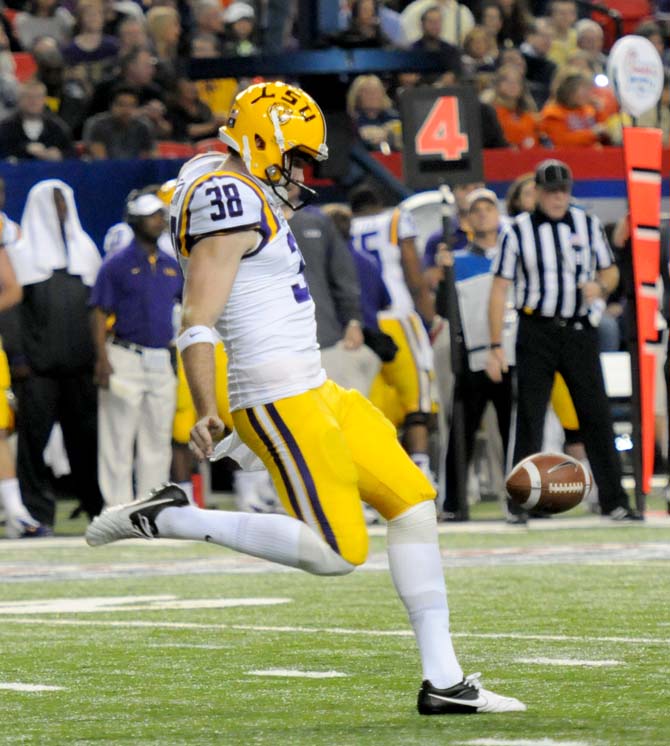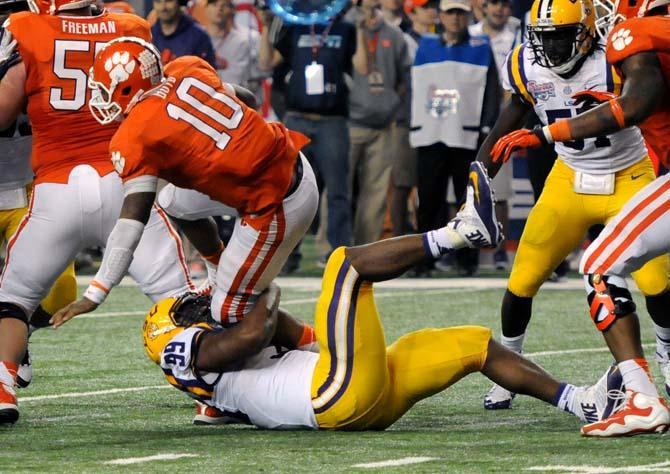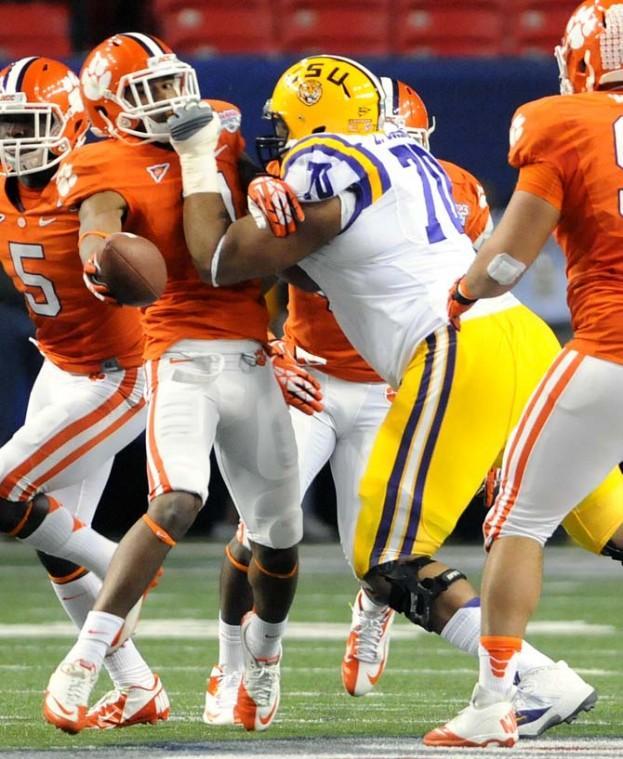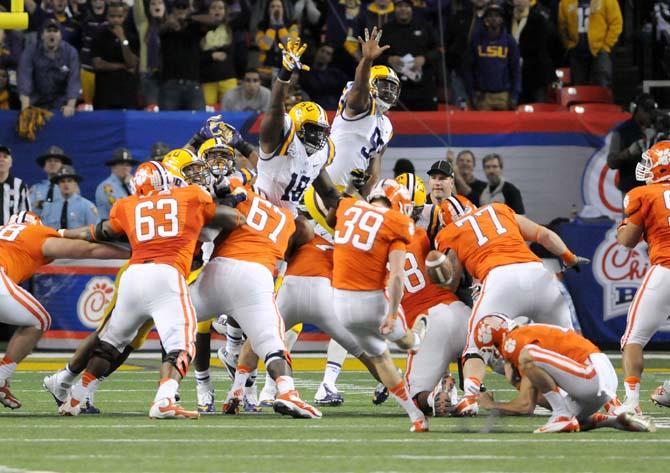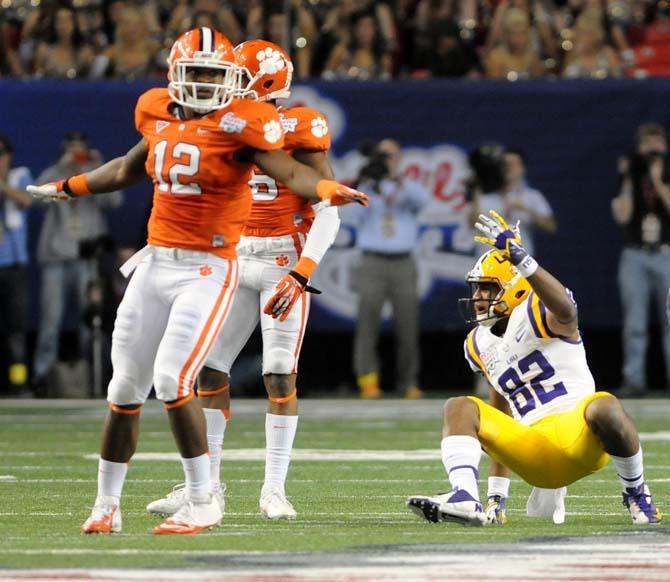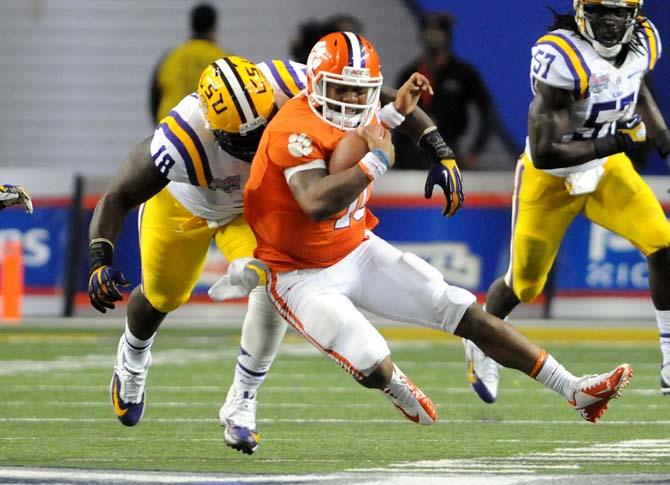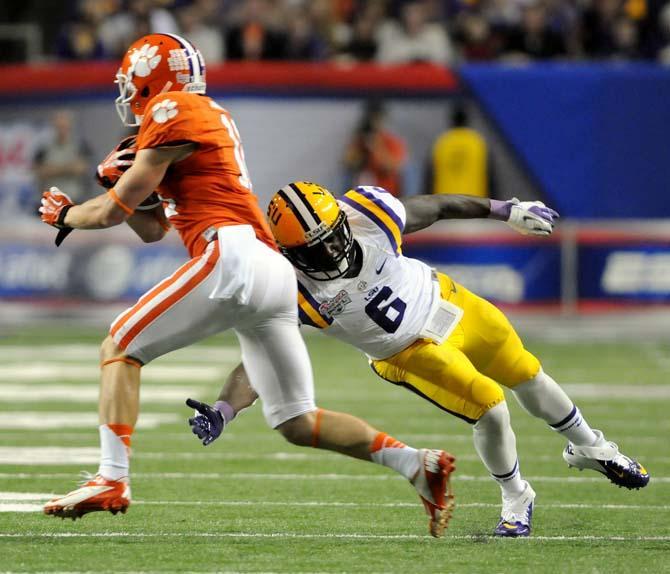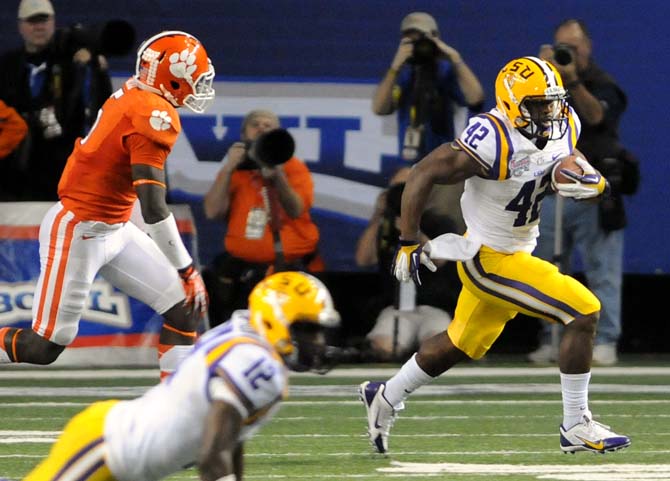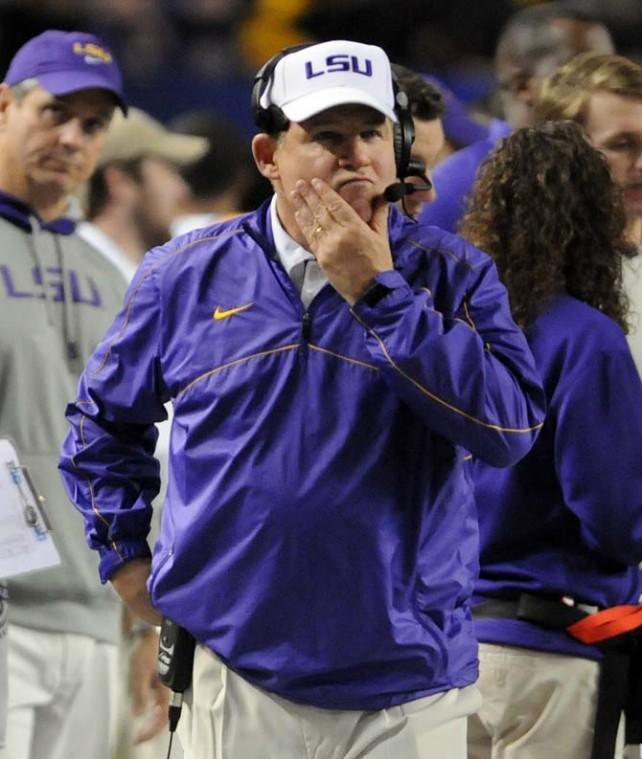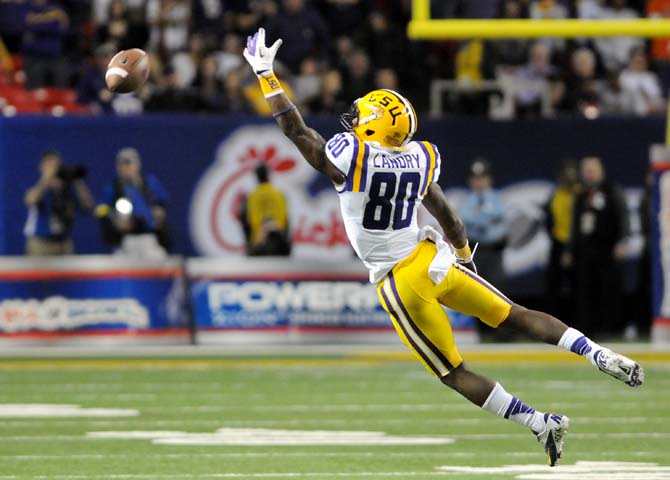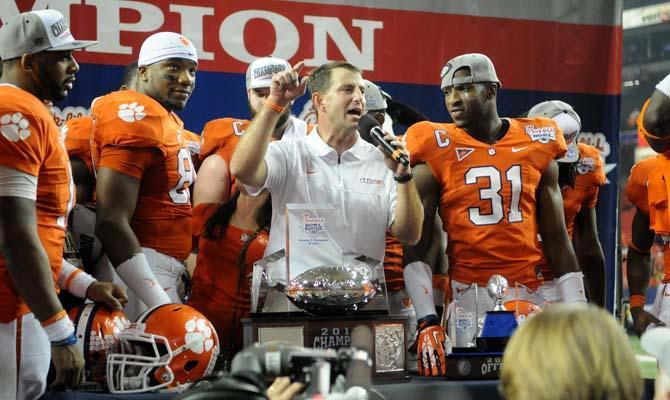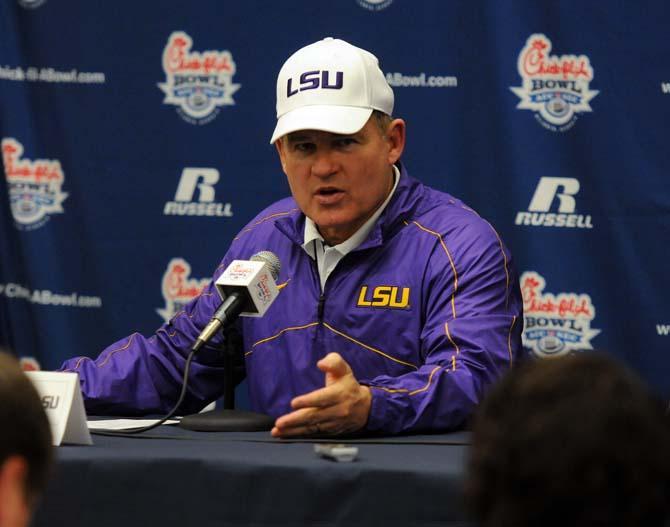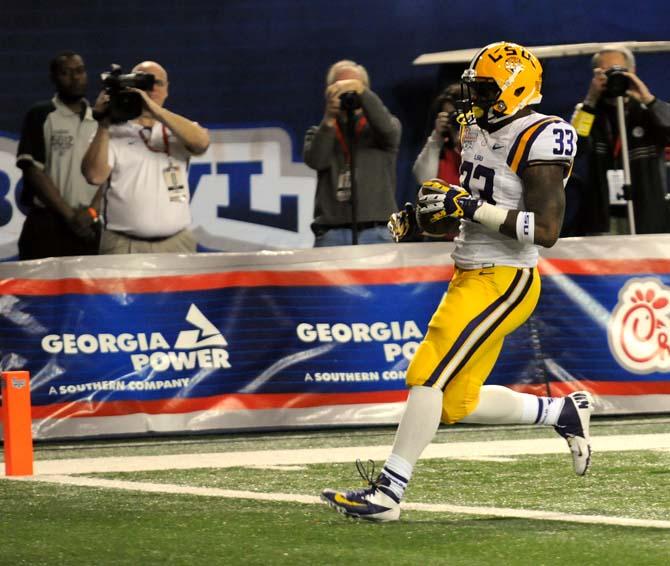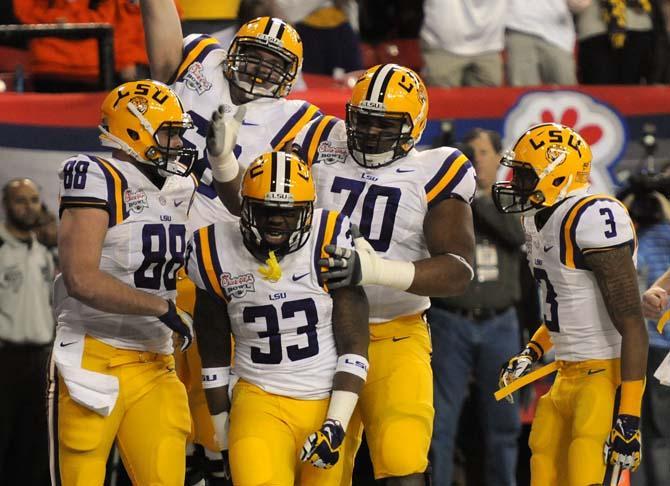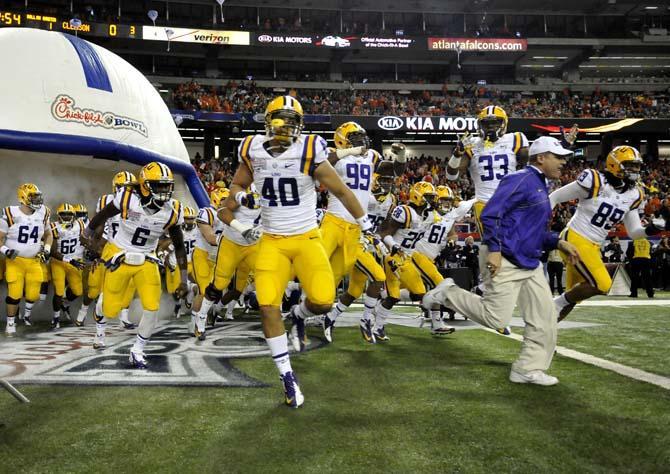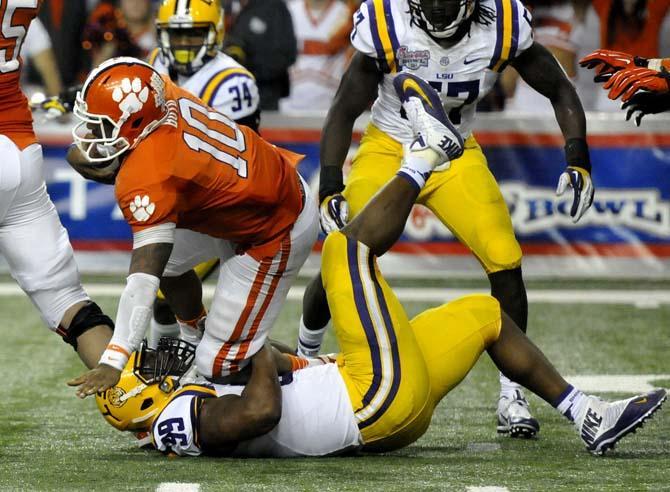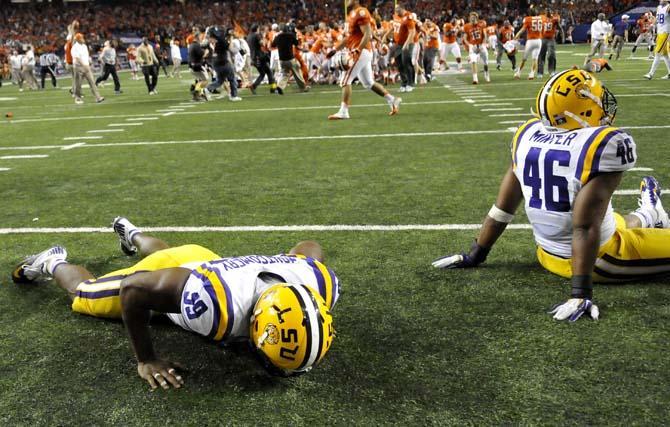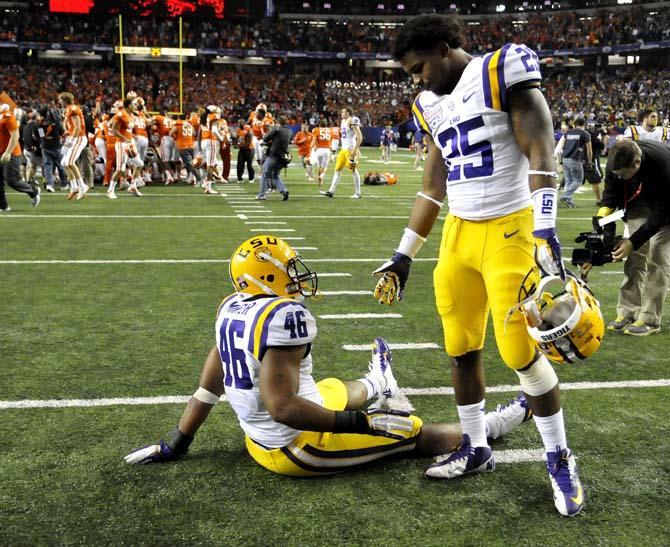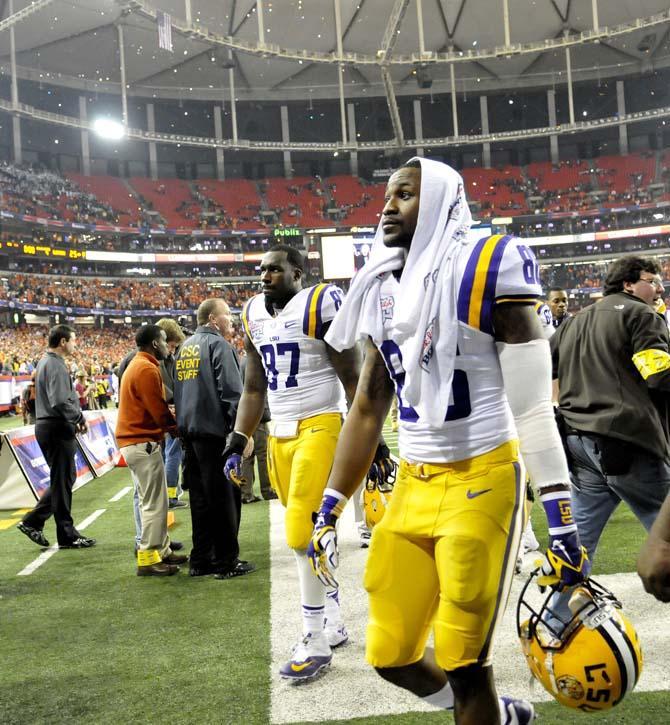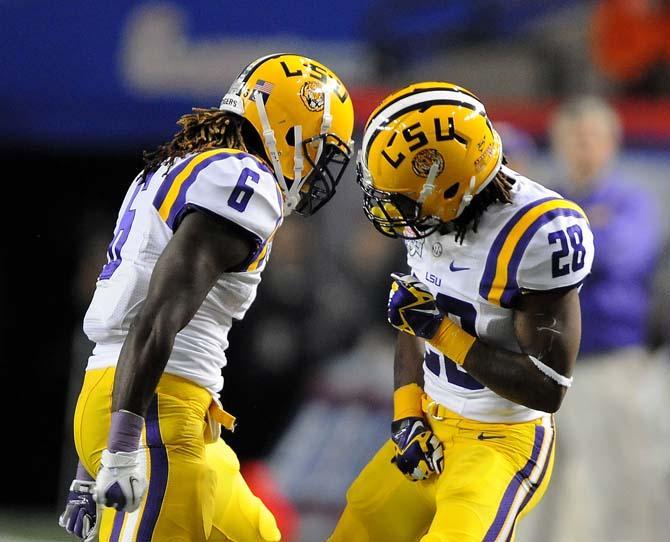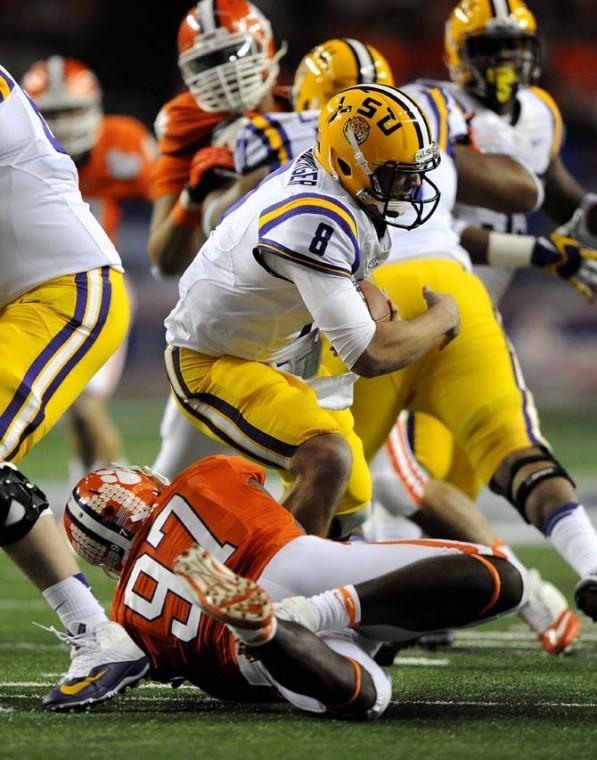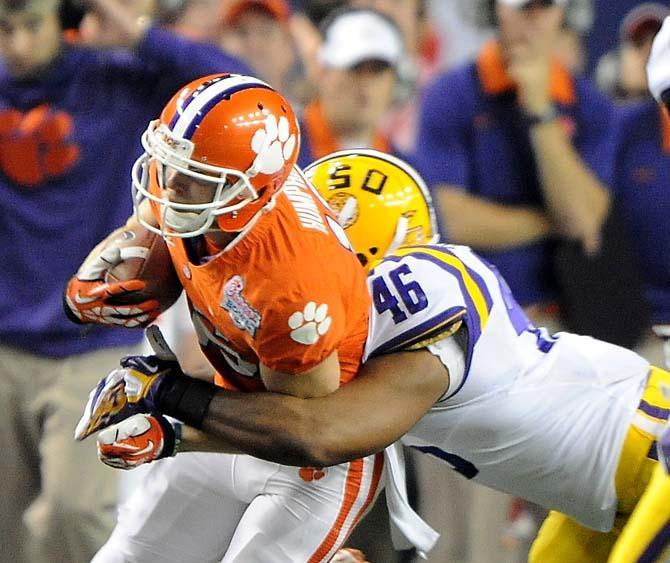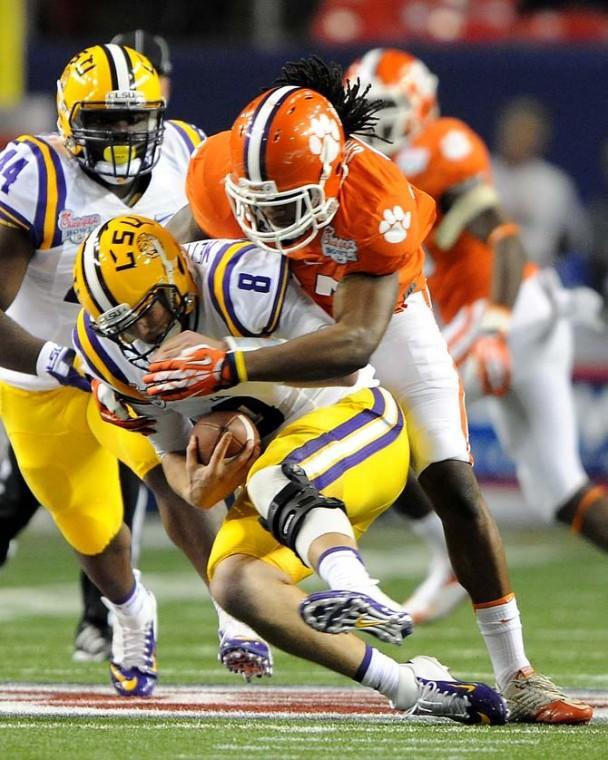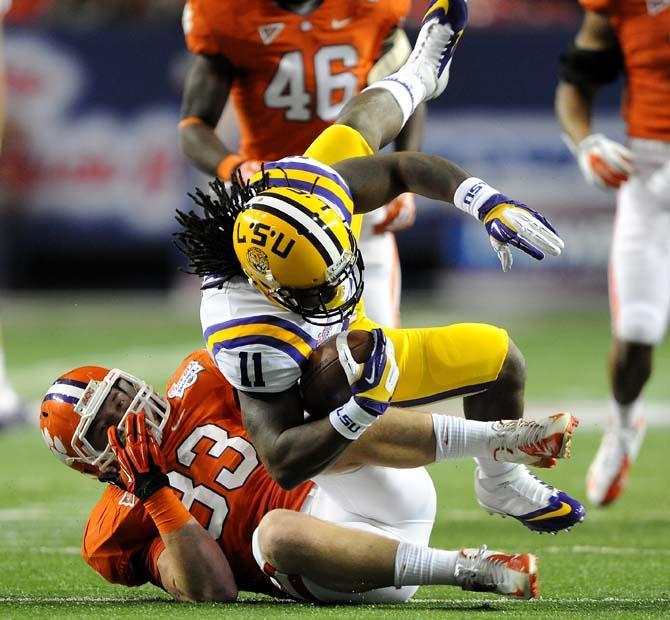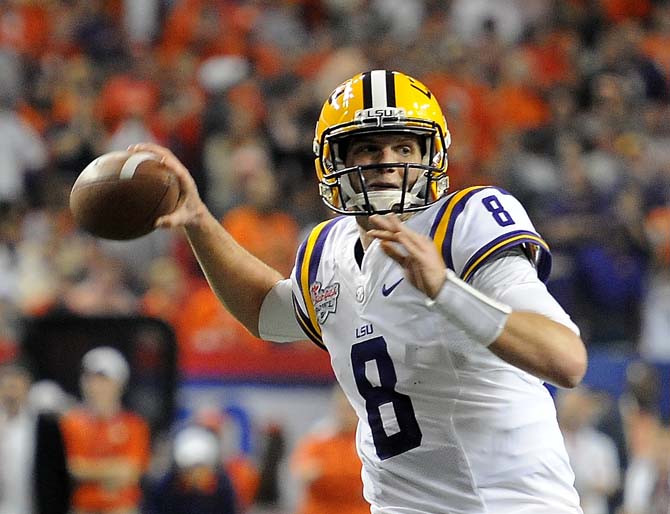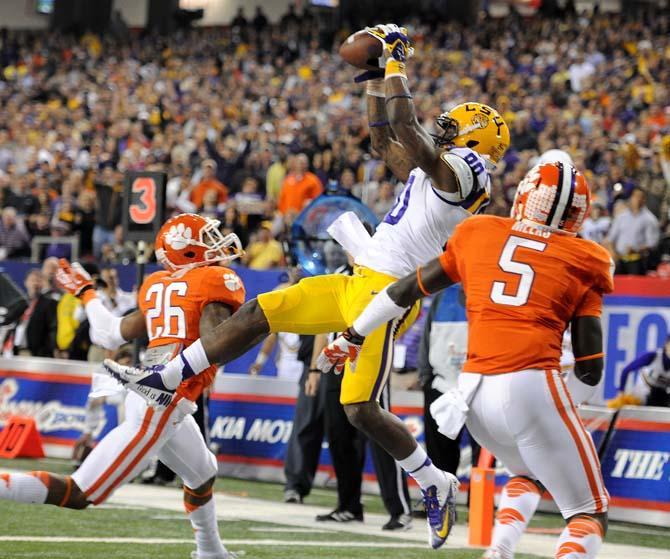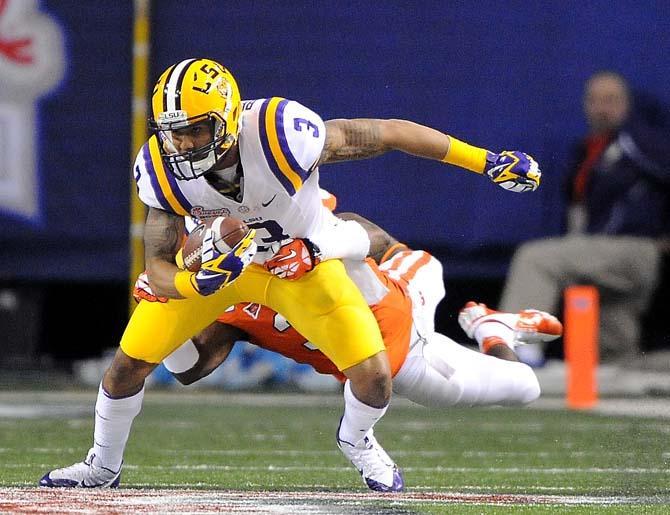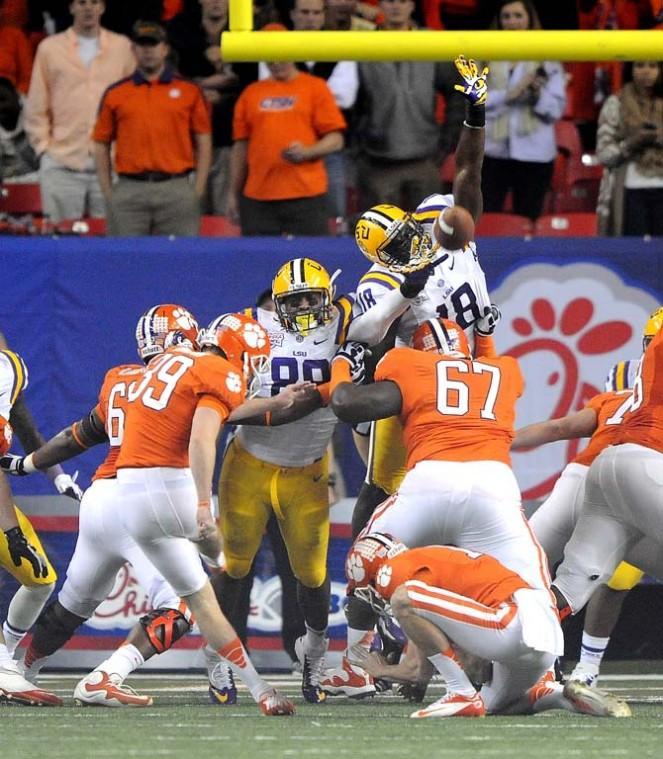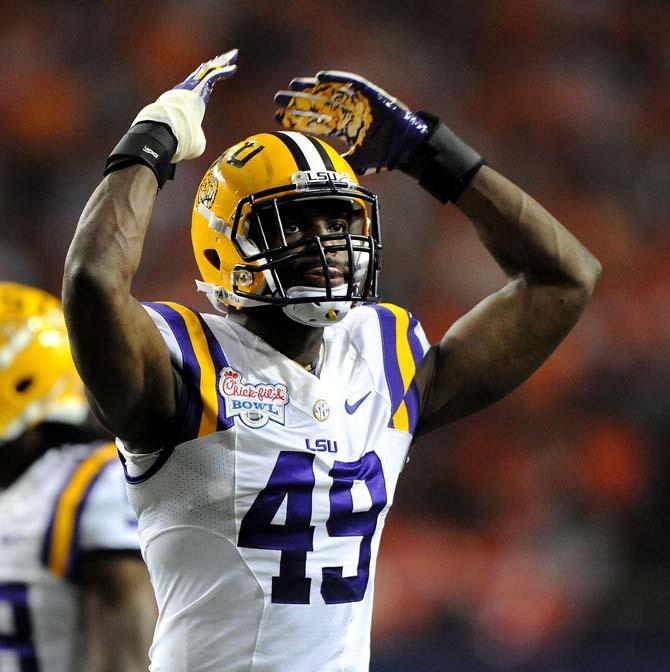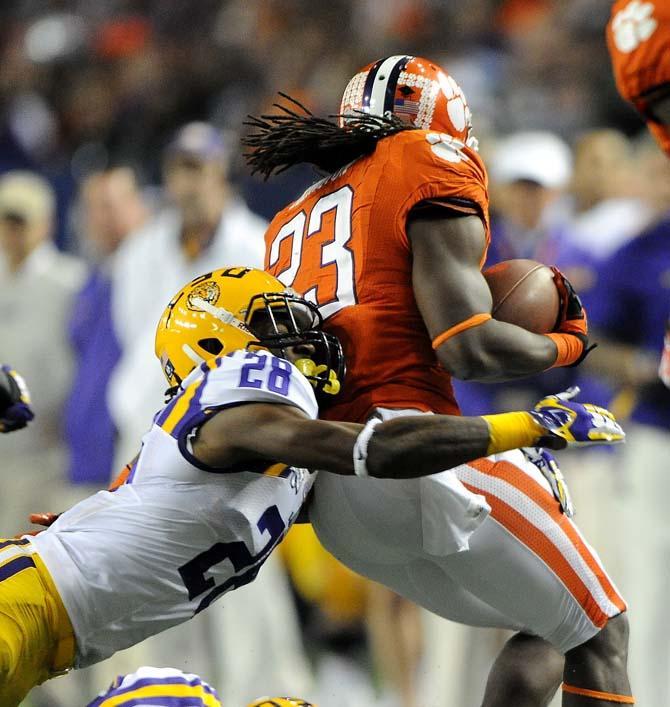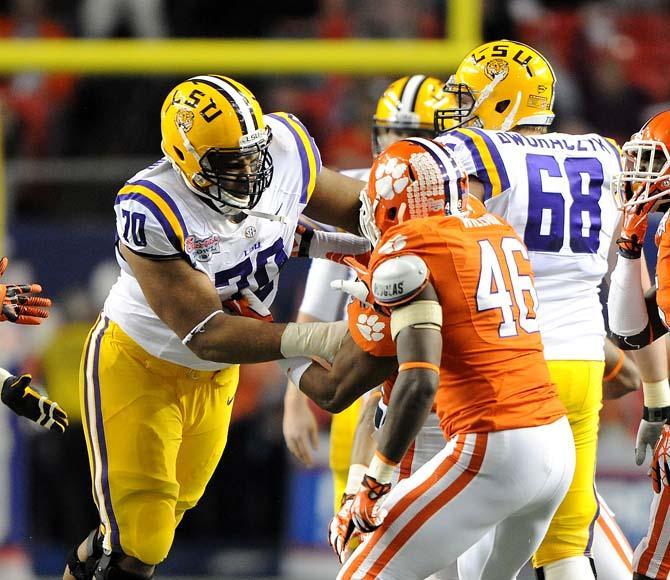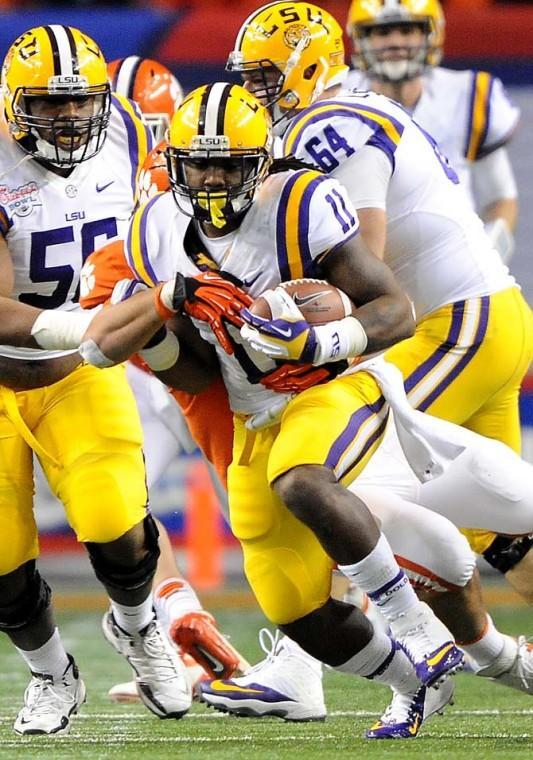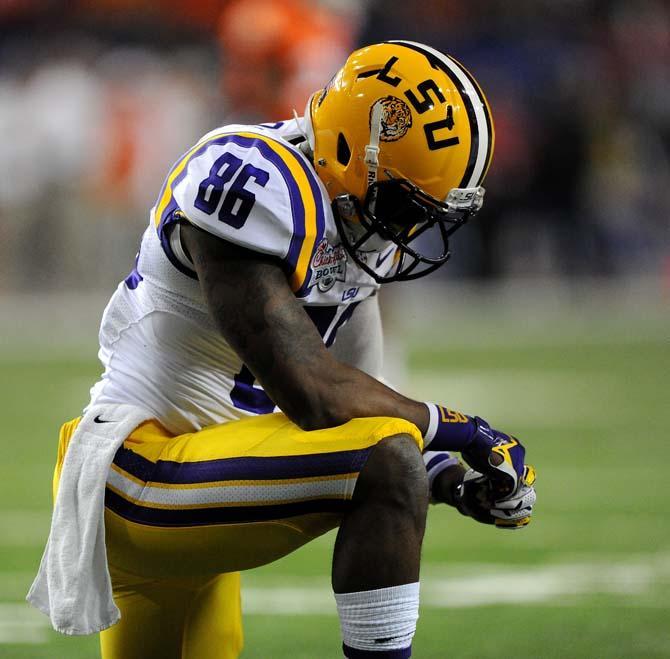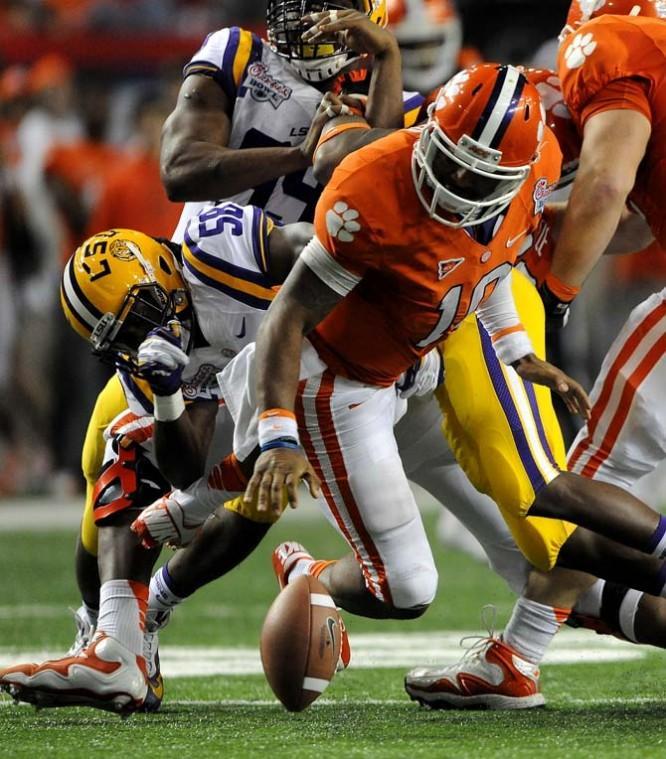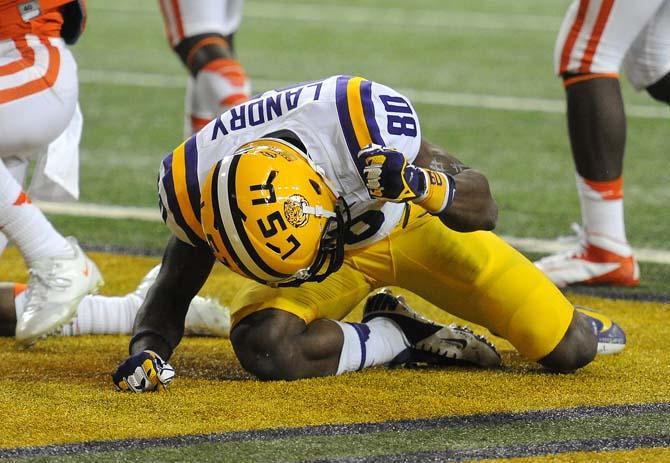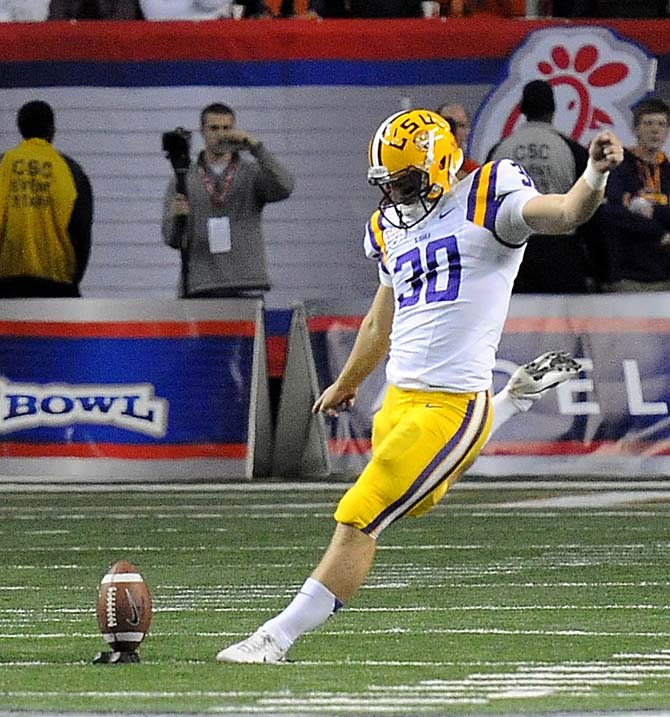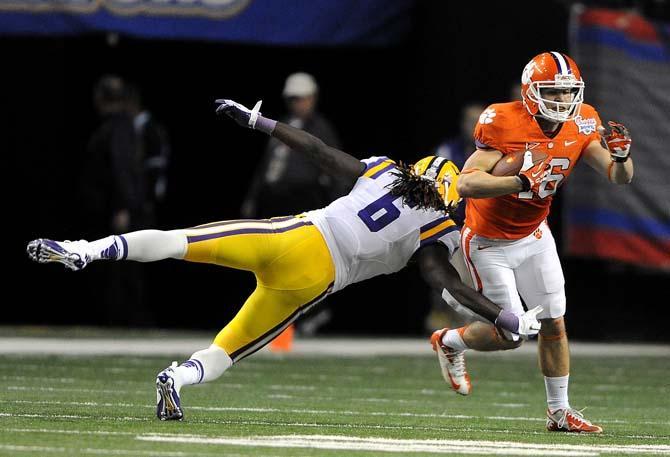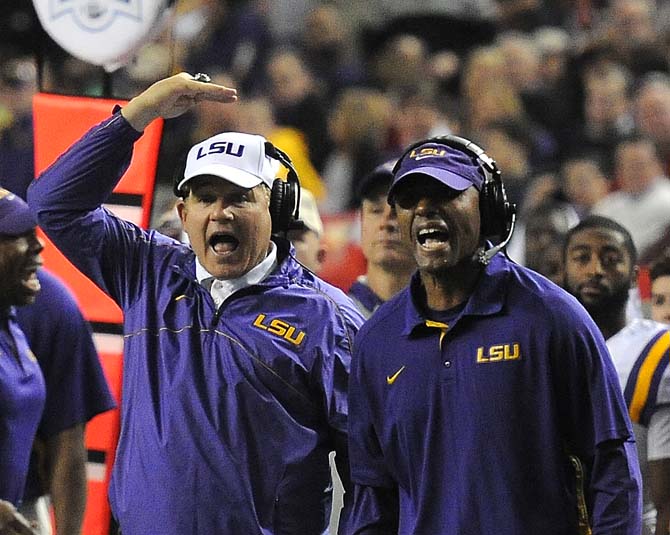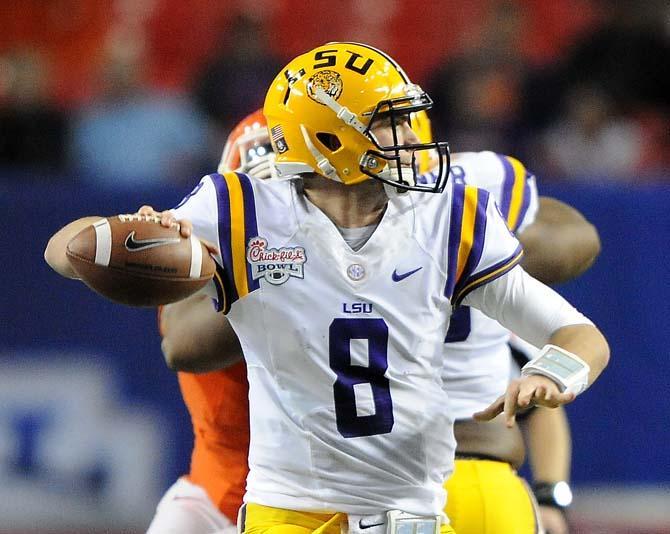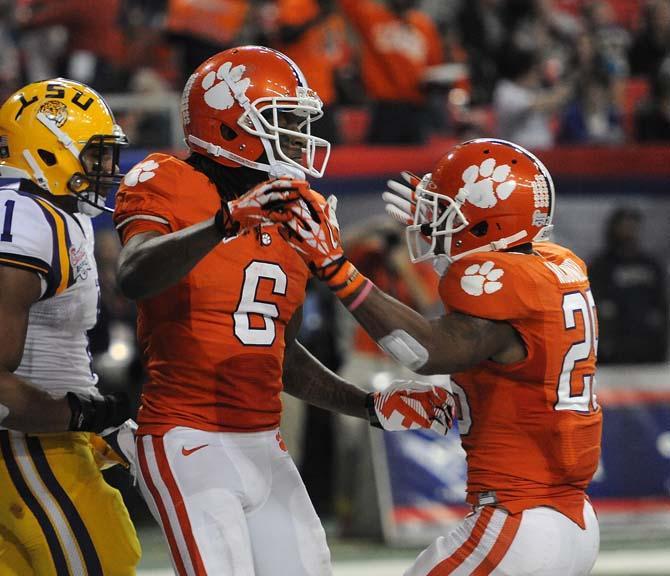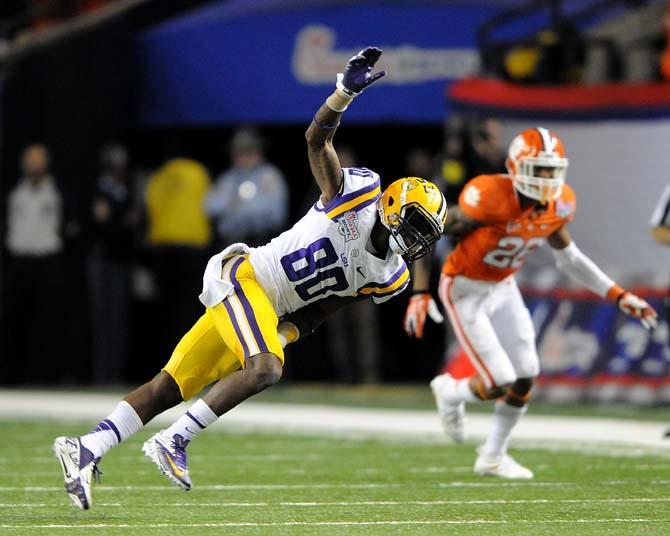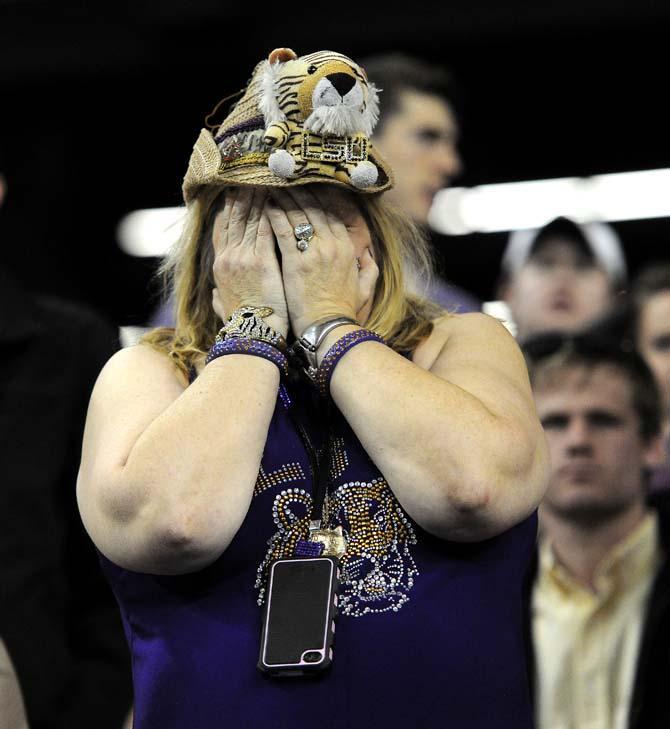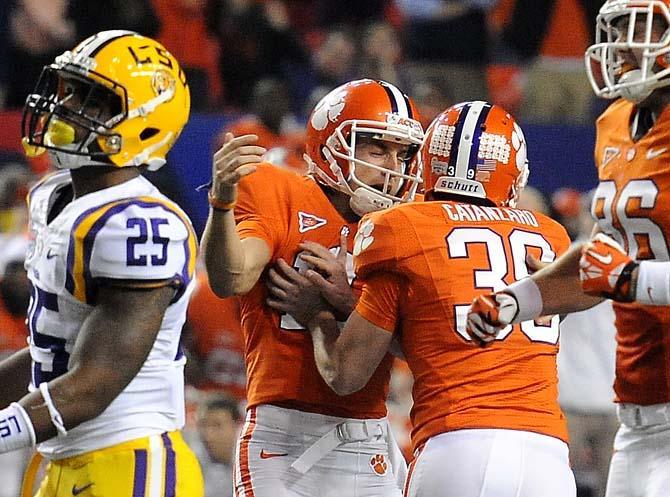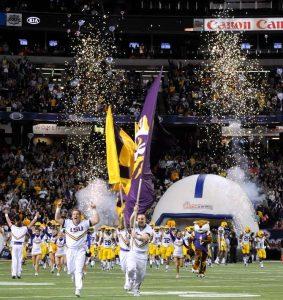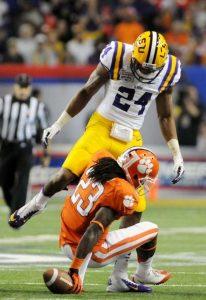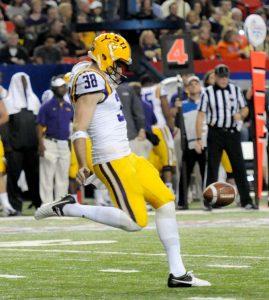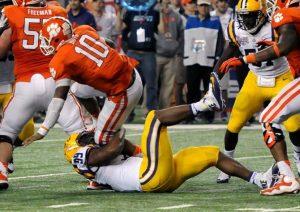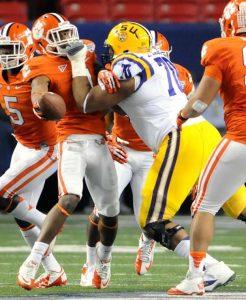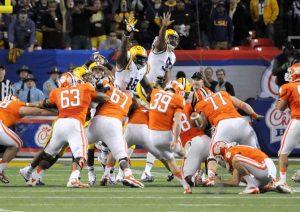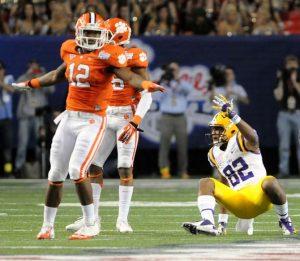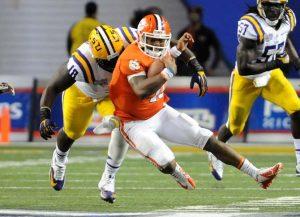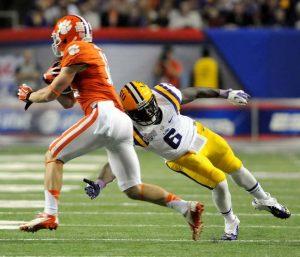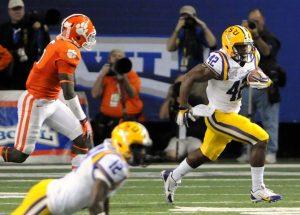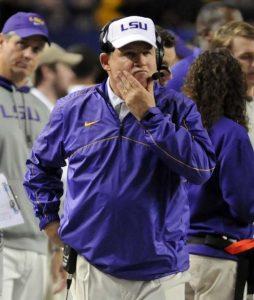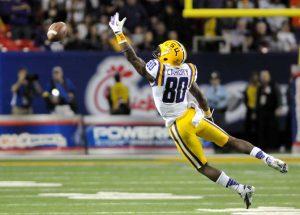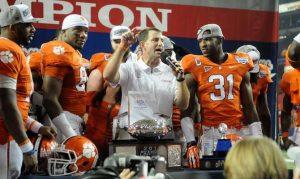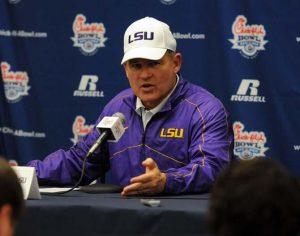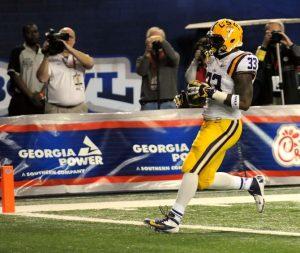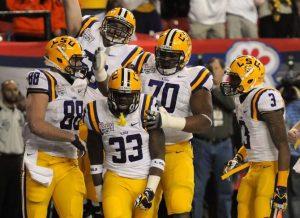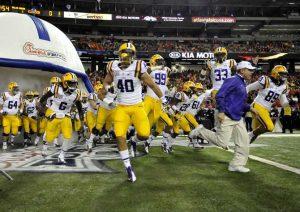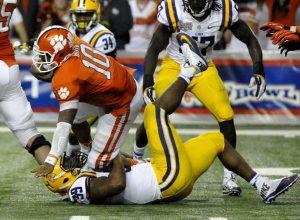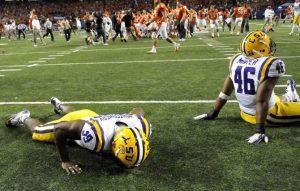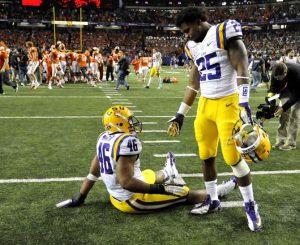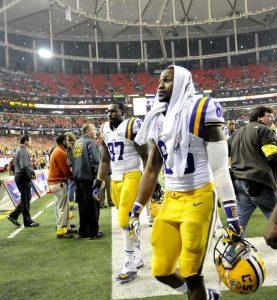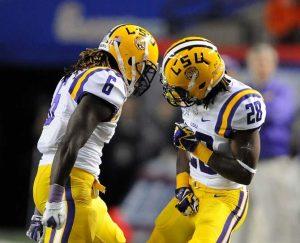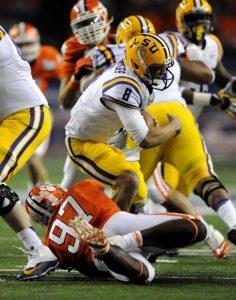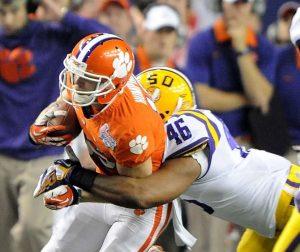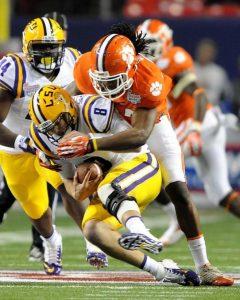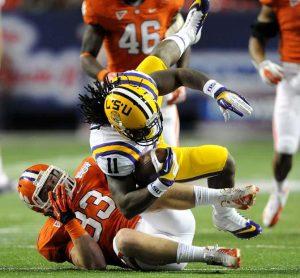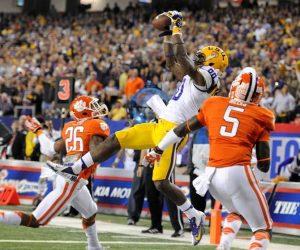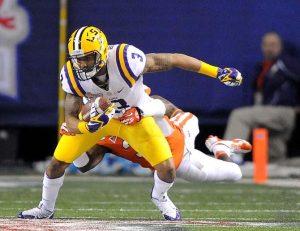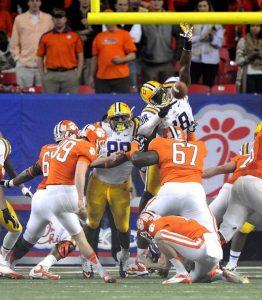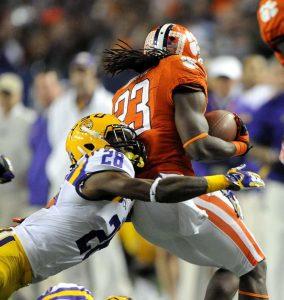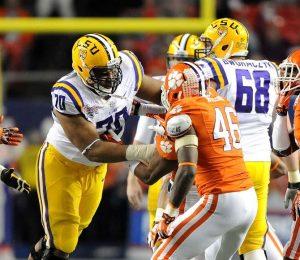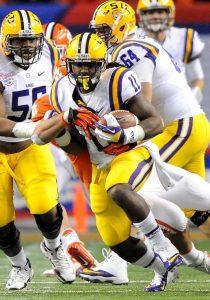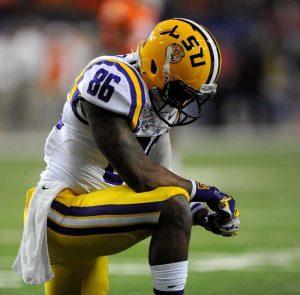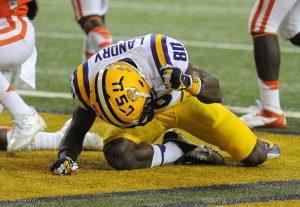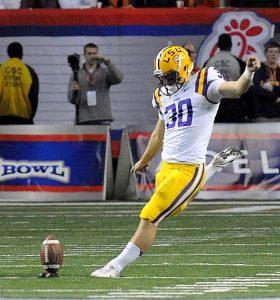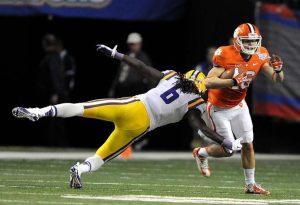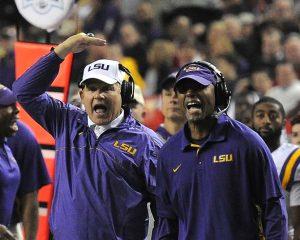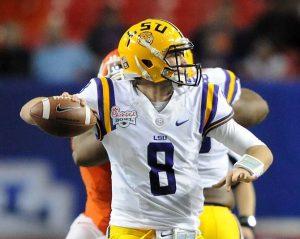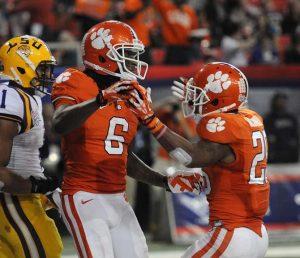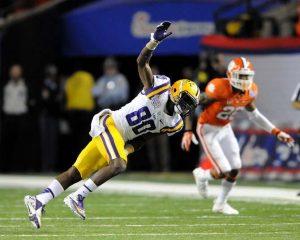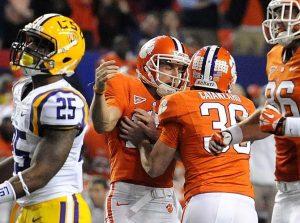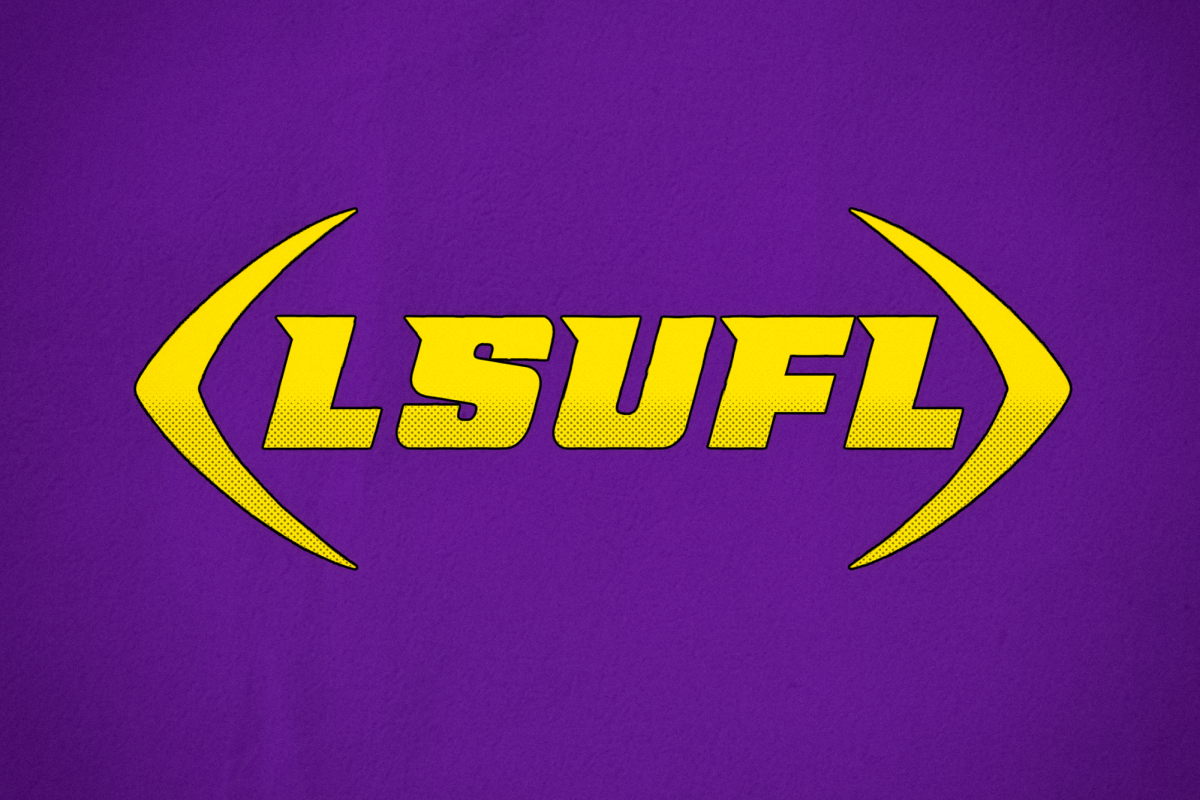THREE UP
Run for the Hills: It’s a shame he wasn’t used more often because freshman running back Jeremy Hill already looks like a seasoned collegiate football player. He was patient in letting his holes develop before impressively bursting for the end zone to give LSU the first lead of the game and showed great vision and agility on his cut-back touchdown run on the opening drive of the second half, which broke Dalton Hilliard’s record for touchdowns by a freshman (12). The performance won for him the offensive MVP award until it was given to Clemson receiver DeAndre Hopkins following the dagger. LSU is known for its stable of backs, most of whom will be seniors next season, but this colt should be its most prized performer for the near future.
The M&M show: In what could be the final game of their careers, juniors Barkevious Mingo, defensive end, and Kevin Minter, linebacker, had performances that will make the decision to stay even more difficult. Working against Clemson’s third-string tackle game after starter Gifford Timothy went down in the first quarter, Mingo was in the backfield all night, making three of his five tackles for loss. A forced fumble by Mingo on Clemson’s game-opening drive set up a two-play touchdown drive and set the tone for a night that would see Clemson quarterback Tahj Boyd repeatedly pounded. Minter ended the season the way he announced his arrival against Florida, nearly matching his output from that game with 19 tackles, a sack and 1.5 tackles for loss and earning defensive MVP for the game.
A special team: The only phase of the game LSU won was special teams. Freshman punter Jamie Keehn, playing for the first time since his start in the North Texas opener, made it known that he shares more than just a country of origin with the banished Brad Wing. Despite some inconsistencies punting in closer quarters, Keehn averaged 44.6 yards on nine kicks, five of them going for over 50 yards, to keep LSU in a statistically lopsided game. Junior running back Michael Ford broke off kickoff returns of 43 and 48 yards, the first of which set up a momentum shifting, single-play touchdown run in the beginning of the first half. Junior defensive tackle Bennie Logan’s blocked extra point looked for a while like it would be the difference in a win.
THREE DOWN
You’re not helping: How can you expect a defense to hold up in a situation like the end of this game when it’s approaching 100 snaps? They hit the century mark exactly by the time Clemson kicker Chandler Catanzaro lined up to drill what would be the clincher. On the other side of the ball, LSU only ran 48 plays, forcing the defense to stay on the field for 36:21. The offense has to be able to keep the out of the hands of players like quarterback Tajh Boyd, who was responsible for 91.9% of Clemson’s 445 yards; LSU coach Les Miles acknowledged as much in the post-game news conference.
Nothing new here, but the play selection also needs to be addressed. After the LSU offensive line cleared the way for Hill’s easy initial touchdown, the most obvious thing would be to keep him heavily involved. He only touched the ball three more times in the half. I was ready to mention halftime adjustments in the “three up” portion until LSU collapsed; when it looked like in the third quarter they’d made feeding Hill a priority with seven more carries, one of them a touchdown, he didn’t rush in the entire fourth period. While a 2nd and 2 from LSU’s 47-yard line would’ve been the perfect opportunity to use him to ice the game, quarterback Zach Mettenberger instead threw two incompletions and gave the ball back to Clemson for the dooming drive.
Clemson moved the chains 32 times to LSU’s eight and bested its average yardage allowed by 192 yards. Miles would be smart to let offensive coordinator Greg Studrawa focus on the woes along his offensive line (see below) and go get a coach renowned for his play-calling.
Pass protection: A month to prepare didn’t help the offensive line to improve on its abysmal performance against Arkansas in the pass-protection category. Mettenberger was sacked six times, the most by Clemson’s defense all season. His hesitance to step up in the pocket doesn’t help, but when Mettenberger wasn’t on the ground in the first half, he was busy going 9-of-12 for 95 yards and a touchdown, finishing 14-of-23 for 120 yards while adding an interception. Miles mentioned the need for improvement on this front multiple times after the game. LSU’s porous protection was the offense’s biggest problem in 2012 and like I said above, Studrawa needs to be able to focus this offseason on what will be an even younger unit next year.
Open airspace: On the flipside, the secondary was the unit that held back the defense all season and that also didn’t change Monday. It looked like they’d been given a break when Clemson receiver Sammy Watkins went down early, but DeAndre Hopkins filled in nicely with 13 catches for 191 yards and two touchdowns. He and his counterparts were open often, especially along the sidelines, allowing Boyd to complete 36 of his 50 attempted passes for two touchdowns. Junior cornerback Tharold Simon, who should be an anchor for this defense, was torched repeatedly to end a disappointing season. The good news though is they will likely only lose Reid to the NFL Draft, meaning a more mature corps in 2013.
-
LSU junior safeties Eric Reid (1) and Craig Loston (6) celebrate Dec. 31 after Loston’s fumble recovery in the first quarter of the Chick-fil-A Bowl in Atlanta, Ga. LSU would eventually lose to Clemson, 24-25.
-
The LSU football team runs out of the tunnel Dec. 31, 2012 before LSU’s 24-25 loss to Clemson in the Chick-fil-A Bowl in Atlanta, Ga.
-
LSU junior cornerback Tharold Simon (24) towers over Clemson senior running back Andre Ellington (23) Dec. 31, 2012 after a tackle during LSU’s 24-25 Chick-fil-A Bowl loss in Atlanta, Ga.
-
Chick-fil-A cows parachute to fans Dec. 31, 2012 before the Chick-fil-A Bowl in Atlanta, Ga.
-
LSU freshman punter Jamie Keehn (38) punts the ball Dec. 31, 2012 during LSU’s 24-25 loss to Clemson in the Chick-fil-A Bowl in Atlanta, Ga. Keehn replaced junior Brad Wing after Wing was suspended Dec. 20.
-
LSU junior defensive end Sam Montgomery (99) sacks Clemson junior quarterback Tajh Boyd (10) Dec. 31, 2012 during LSU’s 24-25 loss to Clemson in the Chick-fil-A Bowl in Atlanta, Ga.
-
LSU sophomore offensive guard La’El Collins (70) commits a personal foul during LSU’s 24-25 loss to Clemson in the Chick-fil-A Bowl in Atlanta, Ga.
-
Clemson junior kicker Chandler Catanzaro (39) kicks the game-winning field goal Dec. 31, 2012 while LSU defenders stretch to block. LSU would lose 24-25.
-
LSU junior wide receiver James Wright (82) wants a flag while Clemson sophomore linebacker Stephone Anthony (12) signals for an incomplete pass Dec. 31, 2012 during LSU’s 24-25 Chick-fil-A Bowl loss.
-
LSU junior defensive tackle Bennie Logan (18) sacks Clemson junior quarterback Tajh Boyd (10) Dec. 31, 2012 during LSU’s 24-15 Chick-fil-A Bowl loss in Atlanta, Ga.
-
LSU junior safety Craig Loston (6) dives toward a Clemson player Dec. 31, 2012 during LSU’s 24-25 Chick-fil-A Bowl loss in Atlanta, Ga.
-
LSU junior running back Michael Ford (42) returns a punt Dec. 31 during the Tiger’s 24-25 Chick-fil-A Bowl loss to Clemson.
-
LSU football head coach Les Miles ponders his next move Dec. 31 during the Tiger’s 24-25 Chick-fil-A Bowl loss to Clemson.
-
LSU sophomore wide receiver Jarvis Landry (80) dives for an overthrown ball Dec. 31, 2012 during LSU’s 24-25 loss to Clemson in the Chick-fil-A Bowl in Atlanta, Ga.
-
LSU senior wide receiver Russell Shepard (10) walks to the locker room Dec. 31, 2012 following LSU’s 24-25 loss to Clemson in the Chick-fil-A Bowl in Atlanta, Ga.
-
Clemson football head coach Dabo Swinney speaks to a crowd of fans and players Dec. 31, 2012 following their 25-24 win over LSU in the Chick-fil-A Bowl in Atlanta, Ga.
-
LSU football head coach Les Miles speaks to the media Dec. 31, 2012 following LSU’s 24-25 loss to Clemson in the Chick-fil-A Bowl in Atlanta, Ga.
-
LSU freshman running back Jeremy Hill (33) waltzes into the endzone Dec. 31, 2012 during the first quarter of the Chick-fil-A Bowl game against Clemson in Atlanta, Ga.
-
LSU freshman running back Jeremy Hill (33) celebrates with his teammates Dec. 31, 2012 after scoring a touchdown in the Chick-fil-A Bowl in Atlanta, Ga.
-
LSU head coach Les Miles leads the Tigers into the Georgia Dome Monday, Dec. 31, 2012 before the Chick-fil-A Bowl against Clemson in Atlanta, Ga.
-
LSU junior defensive end Sam Montgomery (99) sacks Clemson quarterback Tajh Boyd (10) Monday, Dec. 31, 2012 during the Chick-fil-A Bowl against Clemson in Atlanta, Ga.
-
LSU defensive end Sam Montgomery (99) and linebacker Kevin Minter (46) react after LSU’s 24-25 loss to Clemson Monday, Dec. 31, 2012 during the Chick-fil-A Bowl against Clemson in Atlanta, Ga.
-
LSU freshman linebacker Kwon Alexander (25) extends a hand to junior linebacker Kevin Minter (46) Monday, Dec. 31, 2012 after the Tigers’ 24-25 loss in the Chick-fil-A Bowl against Clemson in Atlanta, Ga.
-
LSU senior defensive end Chancey Aghayere and junior wide receiver Kadron Boone walk off the field Monday, Dec. 31, 2012 after the Tigers’ 24-25 loss in the Chick-fil-A Bowl against Clemson in Atlanta, Ga.
-
LSU junior safety Craig Loston (6) and freshman cornerback Jalen Mills (28) celebrate Monday, Dec. 31, 2012 during the Tigers’ 24-25 loss in the Chick-fil-A Bowl against Clemson in Atlanta, Ga.
-
LSU junior quarterback Zach Mettenberger (8) is sacked by Clemson defensive end Malliciah Goodman Monday, Dec. 31, 2012 during the Tigers’ 24-25 loss in the Chick-fil-A Bowl against Clemson in Atlanta, Ga.
-
LSU junior linebacker Kevin Minter (46) tackles Clemson wide receiver Adam Humphries Monday, Dec. 31, 2012 during the Tigers’ 24-25 loss in the Chick-fil-A Bowl against Clemson in Atlanta, Ga.
-
LSU junior quarterback Zach Mettenberger (8) is sacked Monday, Dec. 31, 2012 during the Chick-fil-A Bowl against Clemson in Atlanta, Ga.
-
LSU junior running back Spencer Ware (11) is tackled Monday, Dec. 31, 2012 during the Tigers’ 24-25 loss in the Chick-fil-A Bowl against Clemson in Atlanta, Ga.
-
LSU junior quarterback Zach Mettenberger (8) throws the ball Monday, Dec. 31, 2012 during the Tigers’ 24-25 loss in the Chick-fil-A Bowl against Clemson in Atlanta, Ga.
-
LSU sophomore wide receiver Jarvis Landry catches a pass for a touchdown Monday, Dec. 31, 2012 during the Tigers’ 24-25 loss in Chick-fil-A Bowl against Clemson in Atlanta, Ga.
-
LSU sophomore wide receiver Odell Beckham Jr. is tackled Monday, Dec. 31, 2012 during the Tigers’ 24-25 loss in the Chick-fil-A Bowl against Clemson in Atlanta, Ga.
-
LSU junior defensive tackle Bennie Logan (18) reaches to block an extra point Monday, Dec. 31, 2012 during the Tigers’ 24-25 loss in the Chick-fil-A Bowl against Clemson in Atlanta, Ga.
-
LSU junior defensive end Barkevious Mingo (49) motions to the LSU fans Monday, Dec. 31, 2012 during the Tigers’ 24-25 loss in the Chick-fil-A Bowl against Clemson in Atlanta, Ga.
-
Clemson quarterback Tajh Boyd throws the ball Monday, Dec. 31, 2012 during LSU’s 24-25 loss in the Chick-fil-A Bowl against Clemson in Atlanta, Ga. Boyd was named the bowl’s Most Outstanding Offensive Player.
-
LSU freshman cornerback Jalen Milles (28) tackles Clemson running back Andre Ellington Monday, Dec. 31, 2012 during the Tigers’ 24-25 loss in the Chick-fil-A Bowl against Clemson in Atlanta, Ga.
-
LSU sophomore offensive guard La’El Collins commits an offensive foul Monday, Dec. 31, 2012 during the Tigers’ 24-25 loss in the Chick-fil-A Bowl against Clemson in Atlanta, Ga.
-
LSU junior running back Spencer Ware (11) carries the ball Monday, Dec. 31, 2012 during the Tigers’ 24-25 loss in the Chick-fil-A Bowl against Clemson in Atlanta, Ga.
-
LSU junior wide receiver Kadron Boone (86) reacts after dropping a pass in the end zone Monday, Dec. 31, 2012 during the Tigers’ 24-25 loss in the Chick-fil-A Bowl against Clemson in Atlanta, Ga.
-
LSU junior linebacker Tahj Jones (58) sacks Clemson quarterback Tajh Boyd (10) Monday, Dec. 31, 2012 during the Tigers’ 24-25 loss in the Chick-fil-A Bowl against Clemson in Atlanta, Ga.
-
LSU sophomore wide receiver Jarvis Landry pounds the ground after dropping a pass in the end zone Monday, Dec. 31, 2012 during the Tigers’ 24-25 loss in the Chick-fil-A Bowl against Clemson in Atlanta, Ga.
-
LSU sophomore place kicker James Hairston kicks off Monday, Dec. 31, 2012 during the Tigers’ 24-25 loss in the Chick-fil-A Bowl against Clemson in Atlanta, Ga.
-
LSU junior safety Craig Loston (6) tackles Clemson wide receiver Adam Humphries Monday, Dec. 31, 2012 during the Tigers’ 24-25 loss in the Chick-fil-A Bowl against Clemson in Atlanta, Ga.
-
LSU head coach Les Miles and defensive backs coach Corey Raymond yell at players Monday, Dec. 31, 2012 during the Tigers’ 24-25 loss in the Chick-fil-A Bowl against Clemson in Atlanta, Ga.
-
LSU junior quarterback Zach Mettenberger throws the ball Monday, Dec. 31, 2012 during the Tigers’ 24-25 loss in the Chick-fil-A Bowl against Clemson in Atlanta, Ga.
-
Clemson wide receiver DeAndre Hopkins celebrates with running back Roderick McDowell after scoring a touchdown Monday, Dec. 31, 2012 during the Tigers’ 24-25 loss in the Chick-fil-A Bowl against Clemson in Atlanta, Ga.
-
LSU sophomore wide receiver Jarvis Landry misses a pass on LSU’s last play Monday, Dec. 31, 2012 during the Tigers’ 24-25 loss in the Chick-fil-A Bowl against Clemson in Atlanta, Ga.
-
An LSU fan reacts to the heartbreaking loss Monday, Dec. 31, 2012 during the Tigers’ 24-25 loss in the Chick-fil-A Bowl against Clemson in Atlanta, Ga.
-
Clemson place kicker Chandler Catanzano (30) celebrates with holder Spencer Benton after kicking the game-winning field goal Monday, Dec. 31, 2012 during the Tigers’ 24-25 loss in the Chick-fil-A Bowl against Clemson in Atlanta, Ga.




